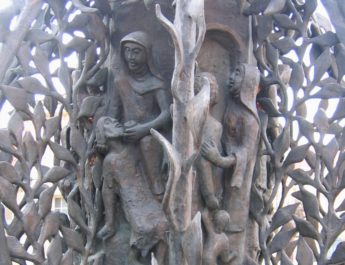Isaiah 44:1-8
Pentecost – A Women’s Lectionary
1 But now hear,A O JacobB my servant,C
IsraelD whom I have chosen!E
A “hear” = shama. This is to hear, call, consent, or consider. It implies listening intelligently, giving attention, and, because of these two factors, obedience and action are often implied.
B “Jacob” = Yaaqob. From the same as aqeb (heel, hind part, hoof, rear guard of an army, one who lies in wait, usurper). This is Isaac’s son and his descendants. The name means heel-catcher or supplanter.
C “servant” = ebed. From abad (to work, serve, compel; any kind of work; used causatively, can mean to enslave or keep in bondage). This is a servant, slave, or bondservant.
D “Israel” = Yisrael. From sarah (to persist, exert oneself, contend, persevere, wrestle, prevail) + el (God or god). This is Israel, meaning God strives or one who strives with God; new name for Jacob and for his offspring. This refers to the people and to the land.
E “chosen” = bachar. This is to choose, appoint, try, excellent.
2 Thus says the LordF who madeG you,
who formedH you in the wombI and will helpJ you:
F “Lord” = YHVH. From havah (to be, become) or hayah (to come to pass, become, be). This is the name of the God of Israel, the self-existent and eternal one, the tetragrammaton. This pronunciation has been lost to time so “Lord” is generally used in its place.
G “made” = asah. This is to make, do, act, appoint, become in many senses.
H “formed” = yatsar. Perhaps related to yatsar (to be narrow, distressed, or vexed); perhaps related to tsarar (to bind, restrict, narrow, be cramped, an adversary). This is to fashion or form, perhaps by squeezing something into a shape or form. Particularly, it is to create as a potter does. Figuratively, it is to determine.
I “womb” = beten. Root may mean to be hollow. This is the belly or womb. It can also refer to a body more broadly.
J “help” = azar. This is to surround, which implies encircling to protect someone or help them out. It can also be help, ally, or support.
Do not fear,K O Jacob my servant,
JeshurunL whom I have chosen.
3 For I will pourM waterN on the thirstyO land
K “fear” = yare. This is to fear, be afraid, dreadful. It can also refer to fearful reverence – to fear in a moral sense is to say to revere, respect.
L “Jeshurun” = Yeshurun. 4x in OT. From yashar (to be straight, right, even, smooth, or agreeable; figuratively, to make something pleasant or prosperous). This is Jeshurun or Yeshurun. It refers to Israel and means “upright one.”
M “pour” = yatsaq. This is to pour out, flow, wash away, or overflow. It can imply melting as one does to cast metal. By extension, it can refer to something being steadfast, stiffened, firmly in place.
N “water” = mayim. This is water, waters, or waterway in a general sense. Figuratively, it can also mean juice, urine, or semen.
O “thirsty” = tsame. 9x in OT. From tsame (to thirst in a literal or figurative sense). This is dry, thirsty, or someone who is thirsty in a literal or figurative sense.
and streamsP on the dry ground;Q
I will pour my spiritR upon your descendantsS
and my blessingT on your offspring.U
P “streams” = nazal. 16x in OT. This is to drip or flow, pour down, flood, distill, or melt.
Q “dry ground” = yabbashah. 14x in OT– word used for dry land in Genesis 1:9-10. From yabesh (to dry up, be withered, be dry; to be ashamed, confused, or disappointed). This is dry land or dry ground.
R “spirit” = ruach. This is breath, wind, air, cool, spirit. This is wind, which resembles the breath and so this can be used figuratively for life itself or being frail/mortal/impermanent. It can refer to the air of the sky or the spirit.
S “descendants” = zera. From zara (to sow or scatter seed; conceive or yield). This is seed or sowing. It can, thus, mean a fruit, plant, sowing time, child, offspring, or posterity.
T “blessing” = barakah. From barak (to kneel, bless; blessing God as part of worship and adoration; blessing humans to help them; can be used as a euphemism to say curse God). This is blessing, which implies prosperity or peace.
U “offspring” = tseetsa. 11x in OT. From yatsa (to go or come out, bring forth, appear; to go out in a literal or figurative sense). This is that which comes forth i.e. offspring, children, crops, springs, etc.
4 They shall spring upV, W like a green tamarisk,X
like willowsY by flowingZ streams.AA
V “spring up” = tsamach. This is to sprout, grow, or spring up – literal or figurative.
W {untranslated} = bayin. From bin (to discern, consider, attend to; distinguishing things in one’s mind or, more generally, to understand). This is among, between, interval.
X “green tamarisk” = chatsir. Perhaps from the same as chatsir (village, settlement); from chatser (enclosure or court – a yard that is fenced in. It could also be a village or hamlet that is walled in); from chatsar (to blow a trumpet, trumpeter, to surround); from chatsotsrah (trumpet). This is grass, plant, hay, leeks.
Y “willows” = arab. 5x in OT. From the same as oreb (raven); from arab (to grow dark, close, become evening); from ereb (evening) or related to arab (to exchange, give or take on pledge, braid, intermix). This is a polar or willow. It is also the name of a wadi in Moab.
Z “flowing” = yabal. 2x in OT. From yabal (to lead, bring, carry, conduct; properly, to flow; to bring or lead with fanfare). This is stream, running, or flowing.
AA “streams” = mayim. Same as “water” in v3. See note N above.
5 This one will say, “I am the Lord’s”;
another will be calledBB by the nameCC of Jacob;
yet another will writeDD on the hand,EE “The Lord’s,”
and adoptFF the name of Israel.
BB “called” = qara. This is to call or call out – to call someone by name. Also used more broadly for calling forth.
CC “name” = shem. May be from sum (to put, place, set). This is name, fame, renown. A name was thought to indicate something essential about a person – something about their individuality. So, this word can also mean honor, authority, or character.
DD “write” = kathab. This is to inscribe, write, record, or decree.
EE “hand” = yad. This is hand, ability, power. Hand in a literal sense, but also what one can do or the means by which one does it.
FF “adopt” = kanah. 4x in OT. This is to give someone an extra name, whether a title or an honor. It could also mean to flatter or to eulogize.
6 Thus says the Lord, the KingGG of Israel,
and his Redeemer,HH the Lord of hosts:II
I am the first,JJ and I am the last;KK
besides me there is no god.LL
GG “King” = melek. From malak (to be or become king or queen, to rise to the throne, to be crowned; by implication, to take counsel). This is king or royal.
HH “Redeemer” = gaal. This is to redeem someone or something according to kinship laws. So, it could be acting on a relative’s behalf to buy back their property, to marry one’s brother’s widow, etc. This could be more briefly translated as to redeem, acts as kinsman, or purchase. As a noun, it could be deliverer or avenger.
II “hosts” = tsaba. From tsaba (to wage war, serve, assemble, fight, perform, muster, wait on). This is a large group of persons (used figuratively for a group of things). It implies a campaign literally as with army, war, warfare, battle, company, soldiers. Can also be used figuratively for hardship or for worship.
JJ “first” = rishon. From rishah (beginning or early time); from rosh (head, captain, or chief; excellent or the forefront; first in position or in statue or in time). This is first, former, ancestor, beginning, ranked first.
KK “last” = acharon. From achar (to be behind, delay, be late, procrastinate, continue). This is end, last, coming behind, to loiter, later. It can also refer to the west.
LL “god” = elohim. Related to “Israel” in v1. See note D above.
7 Who is like me? Let them proclaimMM it;
let them declareNN and set it forthOO before me.
Who has announcedPP, QQ from of oldRR the things to come?SS
MM “proclaim” = qara. Same as “called” in v5. See note BB above.
NN “declare” = nagad. This is to declare, make conspicuous, stand in front, manifest, predict, explain.
OO “set…forth” = arak. This is to arrange by setting in a row. It can also mean to set a battle, estimate, put in order, or compare.
PP “announced” = sum. Related to “name” in v5. See note CC above.
QQ {untranslated} = am. From amam (to darken, hide, associate; creating shadows by huddling together). This is people or nation. It can be used specifically for a tribe, collectively of troops or armies, or figuratively to refer to a flock of animals.
RR “old” = olam. This is a long scope of time whether in the past (antiquity, ancient time) or in the future (eternal, everlasting).
SS “come” = athah. This is to come or bring. It can also refer to the past or future arriving.
Let them tellTT us what is yet to be.UU
8 Do not fearVV or be afraid;WW
have I not toldXX you from of oldYY and declared it?
You are my witnesses!ZZ
TT “tell” = nagad. Same as “declare” in v7. See note NN above.
UU “be” = bo. This is to enter, come in, advance, fulfill, bring offerings, enter to worship, attack. It can also have a sexual connotation.
VV “fear” = pachad. To dread, be afraid, thrill, be in awe. This is properly feeling startled from a sudden sound or alarm and so, more generally, to be afraid.
WW “afraid” = rahah. 1x in OT. From yarah (to throw, shoot, be stunned; to flow as water so figuratively to instruct or teach). This is to fear.
XX “told” = shama. Same as “hear” in v1. See note A above.
YY “old” = az. This is beginning, now, from, since.
ZZ “witnesses” = ed. From ud (to admonish, repeat, duplicate, testify, restore, record, relieve). This is a witness, testimony, or one who records testimony. It can also refer to a prince.
Is there any godAAA besides me?
There is no other rock;BBB I knowCCC notDDD one.
AAA “god” = eloah. Related to “Israel” in v1 & “god” in v6. From el (see note D above). This is God or a god.
BBB “rock” = tsur. From tsur (to confine, cramp, or bind in a literal or figurative sense; to besiege, assault, or distress). This is rock, stone, cliff, boulder, rocky. It can also be a refuge, a way to refer to God.
CCC “know” = yada. This is to know, acknowledge, advise, answer, be aware, be acquainted with. Properly, this is to figure something out by seeing. It includes ideas of observation, recognition, and care about something. It can be used causatively for instruction, designation, and punishment.
DDD “not” = bal. From balah (to grow old, wear out, consume, waste, enjoy, fail, decay). This is not, lest, neither. Properly, it refers to a failure, so it implies nothing or not at all.
Image credit: “Heather” by Jared Hersch, 2016.




